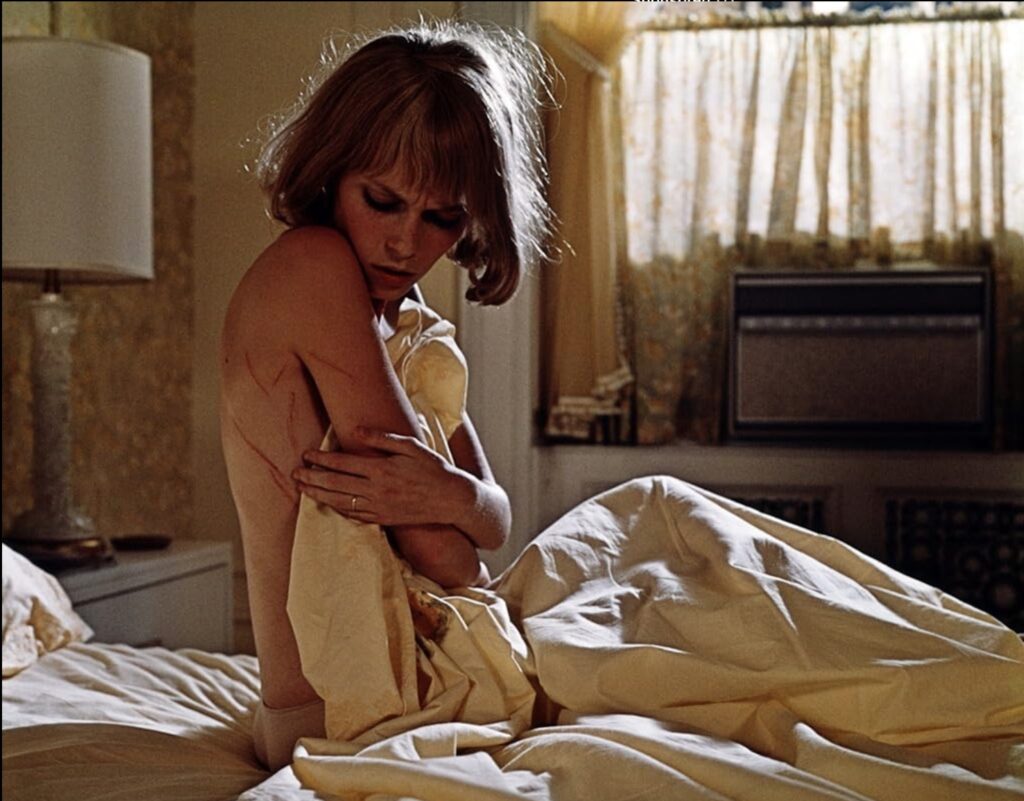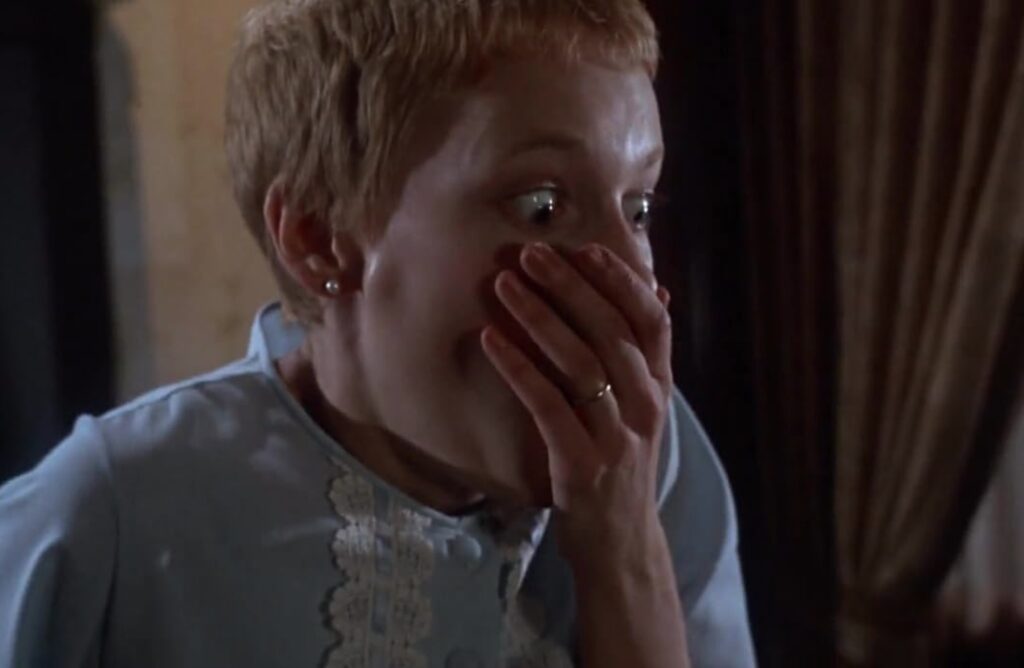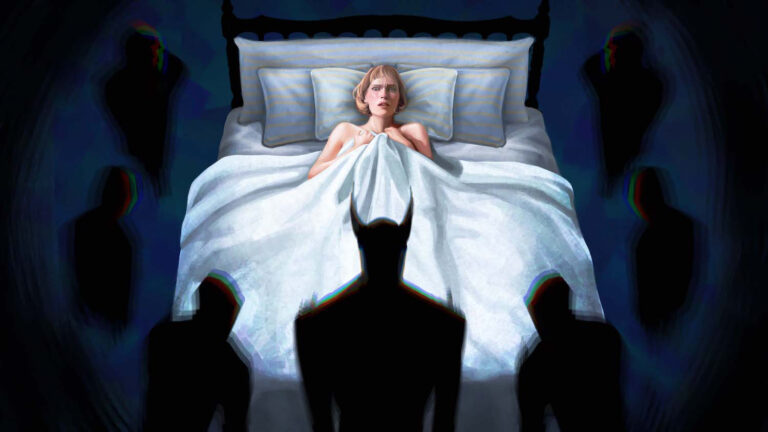Naked, held down and helpless. The horror is dawning on Mia Farrow.
“This isn’t a dream,” she shouts. “This is really happening!”
Farrow’s naive and slightly fragile young Rosemary is both promise and vulnerability. As glowing eyes move in on her, everything about her life is about to change in horrifying ways.
It’s an exaggerated stand-in for a very real issue that half a century later just hasn’t gone away.
Few horror movies offer as clear a metaphor, and as much damning social commentary as Rosemary’s Baby. The movie arrived 55 years ago as the sexual revolution was allowing women to be sexually free for the first time. The birth control pill and certain states legalizing abortion (before Roe v. Wade) made a woman’s sexual freedom a threat to certain portions of society.
But what plays out in Roman Polanski’s tense and tightly focused film, based on Ira Levin’s huge bestseller, is a cautionary tale about what happens when a woman can’t or won’t make her own choices about her life and body. In this case — spoiler alert — she gives birth to a demon.
While Rosemary’s Baby remains one of the greatest horror movies ever made on its sheer slow-boiling horror alone, and despite Polanski’s own offenses against a 13-year-old girl a decade later staining his achievements, recent events have given it new relevance. In a post-Roe v. Wade and #MeToo movement world, the film only reinforces the sense of outright danger many women still feel.

Halloween Every Night’s female writers offered their own thoughts on the film’s lasting horror.
PRISONER OF PATRIARCHY
Rosemary’s Baby showcases the abuse of a woman, disguised under the symbolism of Satanism. The mistreatment of Rosemary indicates countless unspoken beliefs about women, many of which are held by the side characters but also by most of society during its time. When Rosemary gets drugged and raped, her husband, along with the rest of the coven he is involved in, views her as a mere object—a method of fulfilling their own selfish desires. Undoubtedly, there is an immense lack of respect for her. This is even more evident as she slowly realizes the truth. There is an assumption of her incompetence as she is further gaslighted and taken advantage of.
Rosemary, an example of the average everyday woman, is a prisoner of patriarchy. There is a huge emphasis on her and Guy’s relationship, almost painting him as her entire world. He, an example of the typical everyday man, clearly views her as powerless. Even when he openly admits to raping her while she was asleep and jokes about necrophilia, she forgives him nonetheless. Disgustingly, it also implies that her vulnerability was a sexual turn on. He speaks for her often and is manipulative during her pregnancy. When she gives birth to Adrien, the antichrist, she soon accepts the role of its mother after her immediate rejection upon seeing him for the first time. Symbolically, she surrenders to the patriarchy and stays a victim under the control of others.
Overall, the unfortunate events Rosemary suffers through are currently deemed intolerable. However, when we look at the foundational purposes behind the abuse, it is clear the mistreatment of women is not extinct in the current age. In the late sixties, women were often silenced and not taken seriously. Today, women are more comfortable speaking up about their stories, and their independence is more openly celebrated. Despite the small progress that society has made, women are still objectified and dehumanized more often than society would like to admit. As much as we wish, this outcome is not foreign to abusive relationships countless women find themselves in. There is no denying that times are different now, but the world does not stray too far in the injustices we witness in Rosemary’s Baby.
— Natalee Ochoa
PIMPED OUT TO SATAN
Rosemary’s Baby is stylistically beautiful and was revolutionary for its time, but its concepts parallel the perils of today. The writer and director of the movie also being a modern surrogate for the antagonists in the film due to his sordid history.
To achieve his own dreams, Rosemary’s husband, Guy, pimps her out to Satan worshippers. She’s drugged during their dinner date, gaslit, and then raped by Satan himself. When she wakes up with scratches all over her body, her husband tells her that he was the one who had sex with her unconscious body. Even if the mystical elements were taken away from the story, marital rape is something many women experience. It is typically brushed off because sex is seen as a contractual obligation in a marriage.
In Rosemary’s case, she has the added terror of being impregnated by her attacker. Unable to do anything about it, she is forced to take on a maternal role, no matter how traumatizing it is to her. She is told that her baby is a “blessing”, and her weakening body is normal. No one cares about the health of the mother, only the developing fetus. Women have their choice regularly taken from them and Rosemary’s Baby perfectly illustrates that, even if it has controversy of its own.
— Vanessa Feliciano
METAPHOR FOR AN EPIDEMIC
Infuriating.
Out of all the terrible angles I could address about this movie, the thing that struck me most was the irritatingly familiar and nauseating fact that everyone brushes off Rosemary’s feelings constantly. Nobody listens to her. And she had to push down her feelings, making herself and her instincts smaller just to satisfy other people and keep the peace.
It’s insane that we’ve only just recently begun to touch on this epidemic with women, and the concept of being allowed to have a voice and not be called crazy when we express anything other than “positive” agreeable emotion.
— Briana Donze


